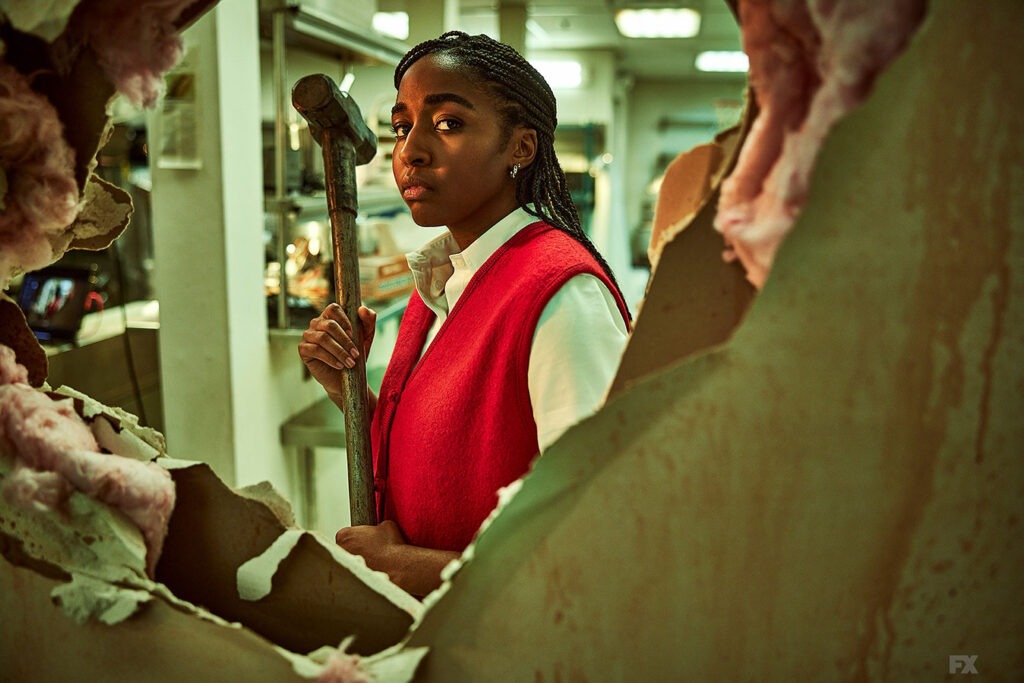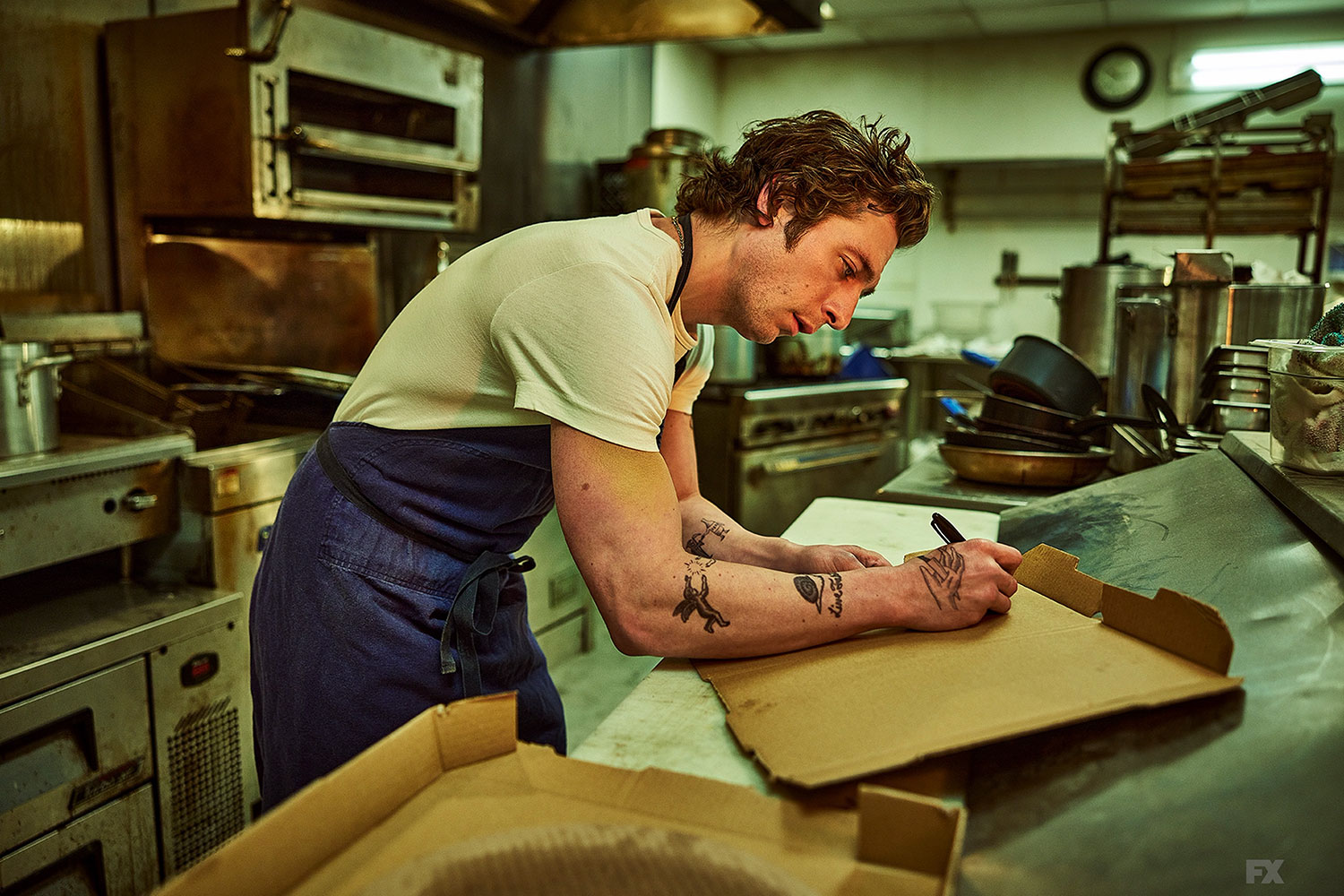The second season of The Bear (all 10 episodes are now streaming on Hulu) starts with a business plan written in marker on a pizza box and ends with the most frenetic friends and family night in the history of friends and family nights. This season doubles down on the theme of shared ordeal, and the ways in which a busy restaurant kitchen can feel like a front-line M.A.S.H. unit during wartime. Our crew of yes-chefs are always ready to leap to battle stations, and they’re sweating, shouting, slicing fennel on a mandolin like their lives depend on it.
This season makes explicit the ways in which people like Carmy, who’ve endured family trauma, fall into this work environment. The sixth episode of this season, “Fishes,” takes us in flashback to a dinner in the Berzatto family home. We meet Carmy and Natalie’s mother Donna, an alcoholic with a borderline personality disorder who is staging an elaborate Feast of the Seven Fishes on Christmas Eve for a full house of family and friends. Between forensic shots of tomato-sauce-shmutzed timers screaming like harpies, we spend a grueling hour in this domestic hellscape. If the terse and claustrophobic “Review” from the first season was like Das Boot with sweet or hot peppers, “Fishes” is more like the overstuffed metaverse of Everything Everywhere All At Once collapsed into a black hole of family dysfunction.
More affecting are the quieter moments when we follow the restaurant staff on their journeys of self-discovery and character building as they train for the battle ahead — the reopening of the once-grimy beef shop as an ambitious tasting-menu restaurant. Marcus the pastry chef develops as an artist who sees where technique and emotion meet in a perfectly realized dish. Tina the line cook finds her capacity for leadership. Ritchie, the jagoff with a chip the size of a Giordano’s stuffed crust on his shoulder, now quotes “Siddhartha”: his calling into front-of-the-house service seems to be nothing short of a quest for enlightenment.
Yet the most moving and fully realized journey is that of Sydney, the chef de cuisine, who is beset by doubts. Can she succeed in this unforgiving business? Can she trust Carmy as a partner? Can she workshop a new dish that isn’t so salty she has to spit it out?
To answer these questions, Sydney — in the episode “Sundae” — embarks on a train tour of the city and takes big bites of everything it has to offer. Real people and places in the Chicago restaurant world abound, and any locals watching this show will need to drop everything upon finishing it for a longanisa breakfast sandwich and mango tart at Kasama or a steaming bowl of dumplings at Lao Peng You. Showrunner Christopher Storer blows a big kiss to his hometown: with all the delicious-looking food and the glamor shots of the CTA Blue Line, it could serve as an ad for Choose Chicago.
But Storer and his culinary director (and sister) Courtney Storer have something more in mind. They’re trying to explore the character of this city as expressed through its food and dining, and they do so with real insight.
The episode starts with Sydney doomscrolling restaurant closures, paying particular attention to the Bristol, a landmark Bucktown spot notable for its early innovations in butchering and nose-to-tail cooking 15 years ago, later morphing into a high-end bistro. It was a quintessential Gen X restaurant, the passing of the old guard.
While testing her inedible dishes with Carmy, he surmises their “palates are wrecked” and the reset button would come courtesy of a meal at Kasama. It’s a canny choice. With its full bakery case, casual daytime fare, and Thursday-Sunday tasting menu that leans into co-owner Tim Flores’s Filipino heritage, Kasama has an only-in-Chicago way of mixing up diner food and tweezer food, munchies and Michelin. Here is the new guard, the restaurant that comes as close as any to distilling today’s zeitgeist. It may even provide inspiration for The Bear, which will pay homage to Carmy’s heritage on the menu (there’s a “seven fishes” course we later learn) and aim for the gastronomic rafters with its tasting menu while also keeping a carryout window for sandwiches.
The other plot lines of this episode (Carmy’s burgeoning romance and interior demolition) keeps him from joining Sydney, so she sets out on her adventure alone. After Kasama she meets with local restaurateurs, real and not, seasoned pros who counsel her about retaining staff, butchering meat and setting terms with a business partner. Yet she spends most of the episode alone absorbing the sights, from iced whelks in a Chinese market (that looks like 88 Marketplace) to trestle bridges spanning the Chicago River.

She keeps eating, too, but as the day progresses she moves away from the expensive and edgy restaurant fare (like Avec’s $34 crisp short rib hummus), replacing it with the simple foods, such as a $5 pepperoni slice from Pizza Lobo. The final bite is the titular sundae at Margie’s Candies — an institution that has been a beacon for a generation of Chicago kids from all backgrounds but hardly a destination for a hotshot culinary grad intent on Michelin stars. Though her performance is mostly wordless, actress Ayo Edebiri is so good at telling you what’s going on inside Sydney with her eyes. A former latchkey kid who grew up in Chicago with a single father, she’s returning to the places and the food that have brought her joy and comfort. She’s looking for her emotional attachment to food, and when she observes a mother and daughter sharing a laugh at another table, she knows that for her it’s something solitary, and that’s okay.
As she rides the CTA back to the restaurant site, a montage of the geometric forms of buildings and windows begins to juxtapose with images of the pasta dish she’s been working on. The city of Chicago itself — its bold forms, blue skies, insistently clattering L — are what will eventually inform her growth as a chef (not to mention her plating). Alas, the pasta she prepares at the end of the episode is still too salty: she’s still too unformed as a chef, too beholden to recipes she doesn’t yet own. But we will see it come together for her in a later episode when she prepares a French rolled omelette for Natalie. Classically, this kind of omelette is considered the first major tests for cooks, but Sydney takes it a step further with the addition of crushed sour cream and onion potato chips. This is her finding self-expression: the formal technique and the packaged comfort food, the reaching for the stars in a city where that’s possible, and the pang of emotional connection to a flavor, however modest. The Bear understands just how Chicago is a crucible for this kind of cooking.



